句子意义和话语意义
语言学知识_语用学
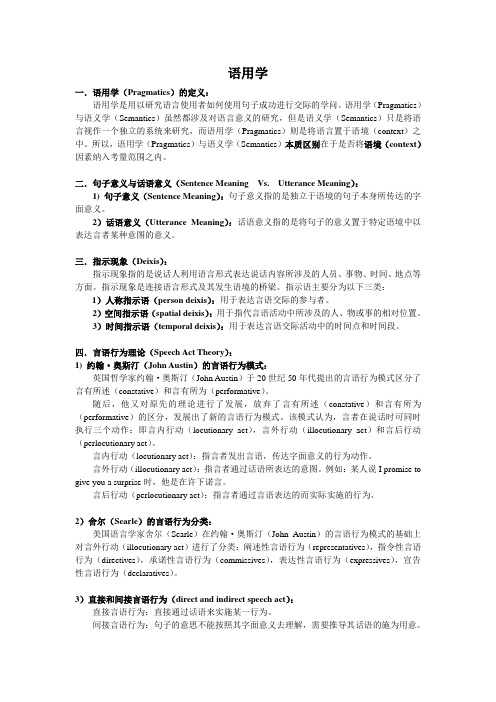
语用学一.语用学(Pragmatics)的定义:语用学是用以研究语言使用者如何使用句子成功进行交际的学问。
语用学(Pragmatics)与语义学(Semantics)虽然都涉及对语言意义的研究,但是语义学(Semantics)只是将语言视作一个独立的系统来研究,而语用学(Pragmatics)则是将语言置于语境(context)之中。
所以,语用学(Pragmatics)与语义学(Semantics)本质区别在于是否将语境(context)因素纳入考量范围之内。
二.句子意义与话语意义(Sentence Meaning Vs. Utterance Meaning):1) 句子意义(Sentence Meaning):句子意义指的是独立于语境的句子本身所传达的字面意义。
2)话语意义(Utterance Meaning):话语意义指的是将句子的意义置于特定语境中以表达言者某种意图的意义。
三.指示现象(Deixis):指示现象指的是说话人利用语言形式表达说话内容所涉及的人员、事物、时间、地点等方面。
指示现象是连接语言形式及其发生语境的桥梁。
指示语主要分为以下三类:1)人称指示语(person deixis):用于表达言语交际的参与者。
2)空间指示语(spatial deixis):用于指代言语活动中所涉及的人、物或事的相对位置。
3)时间指示语(temporal deixis):用于表达言语交际活动中的时间点和时间段。
四.言语行为理论(Speech Act Theory):1) 约翰·奥斯汀(John Austin)的言语行为模式:英国哲学家约翰·奥斯汀(John Austin)于20世纪50年代提出的言语行为模式区分了言有所述(constative)和言有所为(performative)。
随后,他又对原先的理论进行了发展,放弃了言有所述(constative)和言有所为(performative)的区分,发展出了新的言语行为模式。
语言学知识_语用学
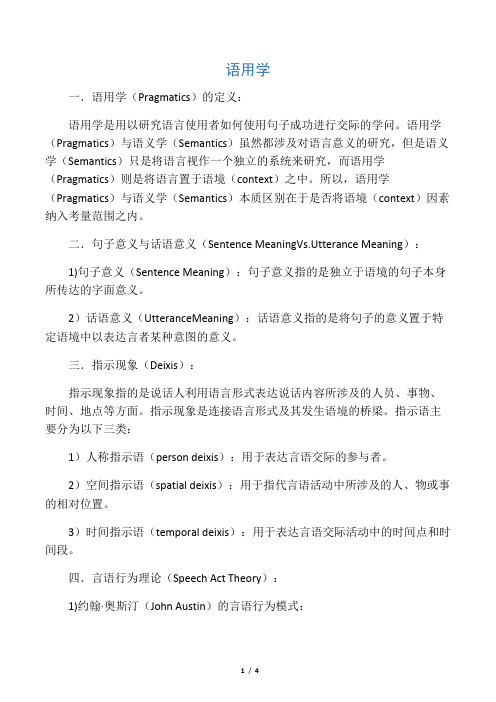
语用学一.语用学(Pragmatics)的定义:语用学是用以研究语言使用者如何使用句子成功进行交际的学问。
语用学(Pragmatics)与语义学(Semantics)虽然都涉及对语言意义的研究,但是语义学(Semantics)只是将语言视作一个独立的系统来研究,而语用学(Pragmatics)则是将语言置于语境(context)之中。
所以,语用学(Pragmatics)与语义学(Semantics)本质区别在于是否将语境(context)因素纳入考量范围之内。
二.句子意义与话语意义(Sentence MeaningVs.Utterance Meaning):1)句子意义(Sentence Meaning):句子意义指的是独立于语境的句子本身所传达的字面意义。
2)话语意义(UtteranceMeaning):话语意义指的是将句子的意义置于特定语境中以表达言者某种意图的意义。
三.指示现象(Deixis):指示现象指的是说话人利用语言形式表达说话内容所涉及的人员、事物、时间、地点等方面。
指示现象是连接语言形式及其发生语境的桥梁。
指示语主要分为以下三类:1)人称指示语(person deixis):用于表达言语交际的参与者。
2)空间指示语(spatial deixis):用于指代言语活动中所涉及的人、物或事的相对位置。
3)时间指示语(temporal deixis):用于表达言语交际活动中的时间点和时间段。
四.言语行为理论(Speech Act Theory):1)约翰·奥斯汀(John Austin)的言语行为模式:英国哲学家约翰·奥斯汀(John Austin)于20世纪50年代提出的言语行为模式区分了言有所述(constative)和言有所为(performative)。
随后,他又对原先的理论进行了发展,放弃了言有所述(constative)和言有所为(performative)的区分,发展出了新的言语行为模式。
语言学教程[第五章意义]山东大学期末考试知识点复习
![语言学教程[第五章意义]山东大学期末考试知识点复习](https://img.taocdn.com/s3/m/04a071e75f0e7cd1852536a4.png)
第五章意义复习笔记I.语义学语义学是对语言单位,尤其是词和句子的意义的研究。
II.意义1.意义在语言学中,意义是指语言所表达的关于现实世界或者想象中的世界的想法。
2.内涵按照哲学界的用法,内涵和外延相对,指的是一个词所指称的实体的特性。
3.外延外延涉及语言单位跟非语言实体之间的关系。
在这个意义上,它跟指称意义是一样的。
4.意义的不同类型(1)概念意义逻辑的、认知的、外延的内容。
(2)联想意义①内涵意义:通过语言所指所传达的意义。
②社会意义:所传达的关于语言使用的社会环境的意义。
③感情意义:所传达的关于说话人/整理感情、态度方面的意义。
④反射意义:通过同一表达方式的其他意思所传达的意义。
⑤搭配意义:通过词语的常用搭配而传达的意义。
(3)主位意义通过顺序和重音这种组织信息的方式所传达的意义。
主位意义是最边缘的意义,因为它只由语序及重音所决定。
5.语境论语境论是建立在如下假设之上:意义源于语境,存在于语境。
语境有两种:情景语境和上下文。
所有的话语都是在特定的时空情景下产生的,除了话语产生的时间地点以外,情景因素还包括说话人和听话人、他们当时的行为以及情景中所存在的物与事。
上下文不仅涉及词与其他词的搭配,这种搭配构成词义的一部分,即搭配意义,它也涉及特定话语的前后部分。
6.行为主义行为主义理论把意义定义为说话者说话的环境以及听者的反应。
Ⅲ.指称理论1.定义把词语意义跟它所指称或所代表的事物了解起来的理论,叫做指称理论。
2.语义三角奥格登和理查兹在《意义的意义》一书中提出了语义三角的理论。
他们认为词与所指事物之间没有直接的关系。
它们是以概念为中介的。
概念是抽象的,没有物质存在,只能通过我们的思维来感知。
3.涵义与指称涵义与指称的区别类似于内涵和外延:前者指一个实体的抽象属性,后者指拥有这些属性的具体实体。
换句话说,Leech的概念意义包括两个方面:涵义和指称。
然而涵义和指称还有其他的不同。
在某种程度上,我们可以说每个单词都有涵义,即概念内容;但并非每个单词都有指称。
什么是句子一年级

什么是句子一年级
作为语文老师,我们需要教授给一年级的学生什么是句子。
句子是日常生活中我们经常使用的语言单位,它是一段完整、有意义的话语表达。
下面我将通过四点分析,来为大家详细讲解一下什么是句子。
第一,语言表达的完整性。
句子是由一个或多个单词组成的,它们有机地组合在一起,可以表达一个完整的意思。
因此,我们在构建句子时,需要注意单词之间的关联性,让语言表达得到充分的完整性。
第二,句子表达的意义。
句子是为了表达特定的意义而存在的。
在日常生活中,我们可以使用句子来传递信息,表达思想和情感等等。
因此,我们在学习句子时,需要掌握与之相关的基本语法知识,这样才能更好地理解和使用句子。
第三,句子的结构。
不同种类的句子有着不同的结构,例如陈述句、疑问句、感叹句和祈使句等等,每种句子结构都有其独特的特点和用法。
在学习句子时,我们需要了解句子的基本结构,并能够灵活运用不同类型的句子来表达自己的意思。
第四,语法的规范性。
句子的语法结构需要满足一定的规范性,这是为了确保语言表达的准确性和可读性。
因此,我们在学习句子时,需要注意词汇的搭配、时态的使用、语序的规定等等,这样才能够构建出符合语法规范的句子。
综上所述,句子是我们日常交流中必不可少的语言单位,它具
有语言表达的完整性、句子表达的意义、句子的结构和语法的规范性等特征。
我们需要掌握句子的基本构成和语法规则,以便更好地表达自己的想法和情感,并与他人进行有效的交流。
好句子是什么意思

好句子是什么意思
好句子是什么意思?
假如你和一个作家一起散步,他会停下来,赞叹某个字,某个句子,某个段落。
对于他来说,那些话语是艺术的语言,具有深刻的内涵。
而对于普通人来说,一个好的句子可能就是一句话,但它却能打动人心。
那么,好句子到底是什么意思呢?
好句子是一种艺术表现,是用语言技巧来表达一种情感、思想、意义的语言结构。
好句子不仅仅是语法正确的一串词,更能让读者感受到作者的用心和思考。
好句子能让人身临其境,感受到文章中的气氛和情感。
例如,“夜色渐浓,喧嚣逐渐消散,只有月光和灯光交织成美丽的画面。
”这句话表现的是一种静谧和美丽的夜景,读者能够感受
到这种宁静的氛围,仿佛自己置身于这种场景之中。
好句子能够点燃人们的情感,让人心生共鸣。
例如,“一个人
的时候,沉默越来越重,心里的忧愁越来越深,唯有在字里行间,才可以释放内心的压抑。
”这句话表现的是一个人的孤独
和内心压抑的感受,很多人也曾经有过这种经历,因此能深深地感同身受。
好句子能够引发人们的思考,让人明白更多的东西。
例如,“生活就像一场旅行,我们需要装备,而装备就是一颗勇敢、
希望和快乐的心。
”这句话告诉我们生活和旅行的相似之处,
引发人们对于生活本质的思考,也让人明白生活需要付出和准
备。
总之,好句子不仅仅是语言表达的工具,更是一种艺术表现。
它能够让我们身临其境、感受情感、引发思考,是一种有意义的表达方式。
对于写作的人来说,好句子更是必不可少的宝贵财富。
只有不断的去学习、去探索、去运用,才能够写出更多更好的语言表达。
《语言学概论》第五章 语义和语用
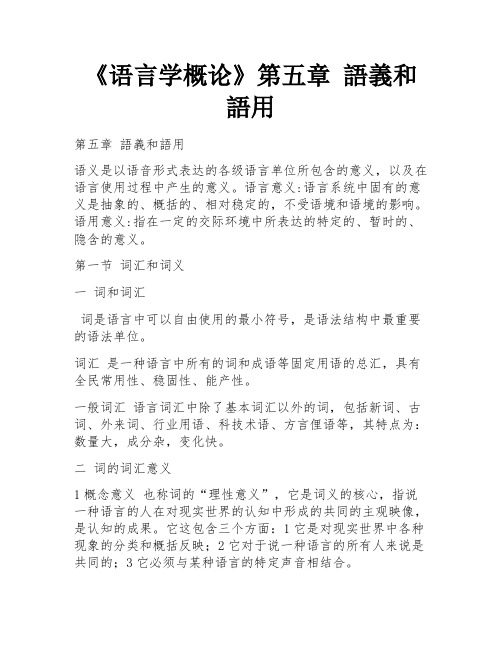
《语言学概论》第五章語義和語用第五章語義和語用语义是以语音形式表达的各级语言单位所包含的意义,以及在语言使用过程中产生的意义。
语言意义:语言系统中固有的意义是抽象的、概括的、相对稳定的,不受语境和语境的影响。
语用意义:指在一定的交际环境中所表达的特定的、暂时的、隐含的意义。
第一节词汇和词义一词和词汇词是语言中可以自由使用的最小符号,是语法结构中最重要的语法单位。
词汇是一种语言中所有的词和成语等固定用语的总汇,具有全民常用性、稳固性、能产性。
一般词汇语言词汇中除了基本词汇以外的词,包括新词、古词、外来词、行业用语、科技术语、方言俚语等,其特点为:数量大,成分杂,变化快。
二词的词汇意义1概念意义也称词的“理性意义”,它是词义的核心,指说一种语言的人在对现实世界的认知中形成的共同的主观映像,是认知的成果。
它这包含三个方面:1它是对现实世界中各种现象的分类和概括反映;2它对于说一种语言的所有人来说是共同的;3它必须与某种语言的特定声音相结合。
2色彩意义也称词的“修辞意义”,是指以理性意义为基础附加上人们的主观态度的意义,包括感情色彩、形象色彩、语体色彩、联想色彩。
a感情色彩:是指说话者对所谈对象的主观感情评价和态度。
有褒、贬、中性之分。
b形象意义:词在获得理性意义的同时,还往往因对对象的描绘而具有某种形象感。
①内部形式比较生动的复合词;②拟声、绘色、摹状的词;③具有比喻义的词。
c语体意义:词用于不同的语体时所产生的一种附加意义。
d联想意义:通过理性意义或语音中介的联想而产生的,大多具有民族特点。
3搭配意义一个词经常与一些词组合而不与另一些词搭配,这种由于组合关系而产生的意义叫搭配意义。
三词义的概括性1一般。
在复合词的词义中可以更清楚地看到,在词义的泛化中,把特殊复杂的东西变成一般简单的东西。
2模糊性。
一个词的意义所指的现象有一个大致的范围,它还必须包含能区别于其他现象的特征,但往往没有明确的界限。
3全民性。
论句子意义和话语意义

论句子意义和话语意义一、引言意义一直都是语言学研究的重点问题之一,但由于其本身所特有的概括性和抽象性,有时候很难对它下定义。
吕叔湘先生在其著作《语文常谈》曾经说过,“任何语言的任何一句话的意义决不等于一个一个字的总和”;“人们的语言活动中出现的意义是很复杂的。
有语言本身的意义,还有环境给予的语言的意义;在语言本身的意义中,有字句显示的意义,有字句暗示的意义;在字句显示的意义之中,有单词的意义,有语法结构的意义。
那么意义究竟是什么?Ogden和Richards在1923年出版了《Meaning of Meaning》一书,书中列出了“意义”的22种意思。
Leech也提出了著名的语义七分法,它们是概念意义,伴随意义,社会意义,情感意义,反映意义,搭配意义和主题意义。
但是对于“意义”本身的定义还是没有完全统一的说法。
我们知道,语义学和语用学都是研究意义的学科,但是它们的侧重点又有所不同。
胡壮麟在2011年第四版的《语言学教程中》中说过:语义学是专门研究语言单位、词语和句子意义的学科(semantics is the study of the meaning of linguistic units, words and sentences in particular),它关注的主要是词和句子本身具有的意义,也即我们常说的书面意义;而语用学是研究语言使用的学科,更依赖语境因素(pragmatics maybe defined as the study of language in use,it depends more on context)它关注的则是在特定的自然和社会环境中说话人或者作者的话语含义,即说话人或者作者想要表达的,能让听话人或者读者理解的内容,以及听话人如何猜测解读出说话人意图和目的。
因此,(汤雪妹,2010:71)从语言研究出发,语言至少可以表示两个不同层次的意义,即句子意义和话语意义,它们分别构成了语义学和语用学的研究对象,利用语境对它们进行区分在日常交际中具有很重要的意义。
句子是指一句话吗
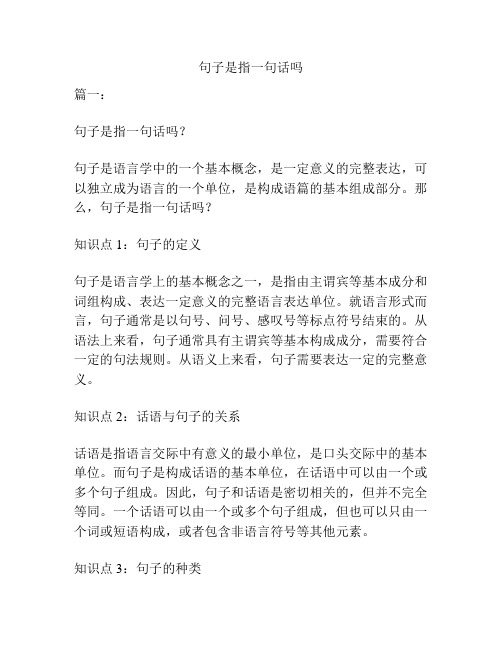
句子是指一句话吗篇一:句子是指一句话吗?句子是语言学中的一个基本概念,是一定意义的完整表达,可以独立成为语言的一个单位,是构成语篇的基本组成部分。
那么,句子是指一句话吗?知识点1:句子的定义句子是语言学上的基本概念之一,是指由主谓宾等基本成分和词组构成、表达一定意义的完整语言表达单位。
就语言形式而言,句子通常是以句号、问号、感叹号等标点符号结束的。
从语法上来看,句子通常具有主谓宾等基本构成成分,需要符合一定的句法规则。
从语义上来看,句子需要表达一定的完整意义。
知识点2:话语与句子的关系话语是指语言交际中有意义的最小单位,是口头交际中的基本单位。
而句子是构成话语的基本单位,在话语中可以由一个或多个句子组成。
因此,句子和话语是密切相关的,但并不完全等同。
一个话语可以由一个或多个句子组成,但也可以只由一个词或短语构成,或者包含非语言符号等其他元素。
知识点3:句子的种类句子根据类型、情态和语气等多方面因素可以分为多种不同的类型。
根据语义上的不同,句子可以分为陈述句、疑问句、祈使句和感叹句等类型;根据情态的不同,句子可以分为肯定句、否定句、可能句、推测句等类型;根据语气的不同,句子可以分为陈述语气、命令语气、建议语气、虚拟语气等类型。
不同种类的句子在语言交际中具有不同的作用和表现形式。
综上所述,句子与话语有关系但并不完全等同,句子是由主谓宾等基本成分和词组构成、表达一定意义的完整语言表达单位,句子的种类根据语义、情态和语气等因素有多种不同类型。
在语言学研究中,句子是构成语篇的基本组成单元,在日常交际中句子则是我们表达信息和交流思想的基本单位。
篇二:句子的定义与话语的区别句子是语言学研究中的基本概念之一,是独立的、有完整意义的语言表达单位。
与之相似的话语是语言交际中有意义的最小单位,那么句子的定义与话语的区别是什么呢?知识点1:句子的定义句子是语言学中的基本概念之一。
通常来说,句子由主语、谓语和宾语等基本成分和词组构成,能够表达一定意义和情感。
生命的意义在于爱自己的句子

生命的意义在于爱自己的句子生命的意义在于爱自己的句子生命的意义是人类心灵最深处一直在探寻的问题,有许多的理论和观点,但其中的一句话却深深地触动了我——生命的意义在于爱自己。
这句简洁而深刻的话语,揭示了一个重要的生命价值——关爱自己。
对于人来说,关爱自己是建立起健康心理和积极心态的关键,是实现个人成长和幸福的基础。
下面,我将围绕这句话,从心理学和哲学的角度来探讨生命的意义在于爱自己。
从心理学角度,爱自己是建立自尊心的基础。
自尊是个人心理健康的重要组成部分,它指的是个体对自己价值和能力的一种评价和肯定。
如果一个人不爱自己,那么就很难被他人看重和认同,从而导致心理上的自卑和不安。
而关爱自己,是对自己的一种信任和自觉的肯定,能够增强自尊心,提升个人的自信和自主性。
只有在爱自己的基础上,才能够建立起积极的心态,面对困难和挫折时,才能够坚定信念,勇敢地迎接挑战。
爱自己还是培养健康心理状态的重要内容。
现代社会充满了各种压力和竞争,人们往往为了追求物质成功而不断努力,但却忽略了内心需求的满足。
心理学研究发现,忽视自己内心的需求,过度追求外在成功会导致情绪的失衡和心理的不健康。
而关爱自己,就是要懂得顾及自己的内心需求,在追求物质成功的同时,也要保持心灵的平衡和内心的富足。
只有在心理状态良好的时候,人才能够保持积极、开放和乐观的态度去面对生活的种种挑战。
除此之外,爱自己也是建立健康人际关系的重要前提。
人的生命是与他人相互交织而成的,良好的人际关系不仅关系到个体的幸福感和满意度,也对身心健康有着重要影响。
而爱自己,是与他人建立良好关系的基础。
只有当我们爱自己、尊重自己、保护自己的权益时,才能够与他人建立平等和谐的沟通与交流。
同时,爱自己也是为了给他人更好的关怀和爱,只有了解和满足自己的需求,才能够理解和满足他人的需求。
因此,爱自己是建立良好人际关系的重要前提,也是保持人际关系活力和和谐发展的重要保障。
从哲学角度来看,爱自己是实现人生价值的基础。
语用学——精选推荐

语⽤学语⽤学概述1、定义语⽤学,研究在不同语境中话语意义的恰当地表达和准确地理解,寻找并确⽴使话语意义得以恰当地表达和准确地理解的基本原则和准则。
(见教材14页)1)今天是星期天。
句⼦的字⾯意义:⼀个判断,说话⼈说话的当天是⼀个星期七天中的第⼀天。
话语的语境意义:①妻⼦对伏案⼯作的丈夫说此语,意思是建议他好好休息。
②妻⼦对答应星期天帮她作家务活的丈夫说此语,意思是提醒丈夫快去作家务。
③想去春游的⼉⼦对让他在家复习的妈妈说此语,意思是请求或建议他妈妈带她去玩或者同意他去玩。
这是外星⼈。
句⼦的字⾯意义:⼀个判断,说话⼈说近处的某⼈是来⾃地球之外的。
话语的语境意义:在2008年北京奥运会上美国游泳运动员菲尔普斯夺取了⼋枚⾦牌,打破了斯⽪茨36年前创造的个⼈获得七枚⾦牌的⼈类奇迹。
这是在蝶泳、蛙泳、仰泳、⾃由泳等各项⽐赛时电视评论员和赛后记者的评论。
意思是说:他是⼀个天赋异禀的运动员,创造了⼈类运动史上的奇迹。
3)妈妈,那是什么?句⼦的字⾯意义:说话⼈对妈妈的⼀个询问,询问妈妈附近或者远处的某事物是什么东西。
话语的语境意义:①⼉⼦⽤⼿指着⾯包店卖的⾯包,明知那是⾯包,却故意询问,此时她表达的意思是“妈妈,我想吃⾯包”或者“妈妈,我饿了”。
②⼉⼦在动物园⾥⽤⼿指着从未见过的长颈⿅说此语,就仅是⼀种询问,不可能是要表达“我想买长颈⿅”或“我想吃长颈⿅”。
4)你能载我去机场吗?句⼦的字⾯意义:说话⼈对对⽅的⼀种询问,询问对⽅是否具有⽤车送⾃⼰去机场的能⼒。
话语的语境意义:①说话⼈对邻居或亲友说此语,意思是向对⽅发出请求,请求对⽅⽤车送⾃⼰去机场。
②说话⼈对出租车司机说此语,就仅是⼀种询问,询问对⽅是否具有⽤车送⾃⼰去机场的能⼒。
5)(电话铃响)接电话者:喂,你好!哪⼀位?打电话者:你好!我是……。
电话会话的开端规律:先说话的总是接电话的⼀⽅。
这是⼀个由召唤(拨电话:发出电话铃声)和应答组成的相邻对。
是由⼈类会话结构规律决定的。
用意思的两种含义写句子

用意思的两种含义写句子
摘要:
1.介绍“意义”一词的两种基本含义
2.构造两个例句,分别展示“意义”在两种含义下的用法
3.总结“意义”一词在不同情境下的重要性
正文:
“意义”一词在日常语言中有两种基本的含义。
第一种含义是指某事物所具有的重要性或价值,通常用于描述事物的深层内涵。
例如,我们可以说“这本书对我的人生意义重大”,表示这本书对我个人的成长有着重要的影响。
第二种含义是指通过符号、语言等手段传达出来的信息或含意,通常用于描述表达方式的传达效果。
例如,我们可以说“他的话里有意义”,表示他的话语传达了一些深层次的信息或思想。
为了更好地理解“意义”的这两种含义,我们可以构造两个例句。
第一个例句:“这篇文章对我国经济发展的意义深远。
”在这个句子中,“意义”指的是文章所传达的信息对我国经济发展的重要性和价值。
第二个例句:“他这句话的意义是鼓励我们要努力奋斗。
”在这个句子中,“意义”指的是他通过这句话传达出来的信息是鼓励我们努力奋斗。
“意义”一词在这两种含义下都有着重要的作用。
当我们在描述事物的重要性或价值时,使用“意义”这个词可以让我们更准确地表达我们的观点。
同样,当我们在分析他人的表达方式时,使用“意义”这个词可以帮助我们更深入地理解他人的意图。
小学语文阅读之理解句子含义与句子作用(学生)
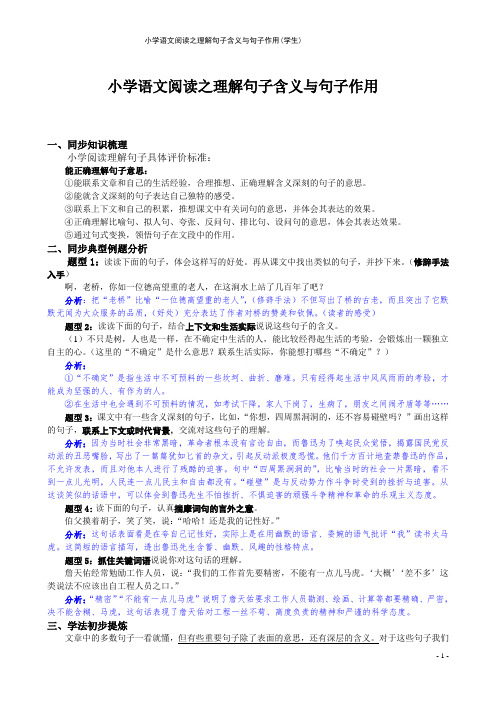
小学语文阅读之理解句子含义与句子作用一、同步知识梳理小学阅读理解句子具体评价标准:能正确理解句子意思:①能联系文章和自己的生活经验,合理推想、正确理解含义深刻的句子的意思。
②能就含义深刻的句子表达自己独特的感受。
③联系上下文和自己的积累,推想课文中有关词句的意思,并体会其表达的效果。
④正确理解比喻句、拟人句、夸张、反问句、排比句、设问句的意思,体会其表达效果。
⑤通过句式变换,领悟句子在文段中的作用。
二、同步典型例题分析题型1:读读下面的句子,体会这样写的好处。
再从课文中找出类似的句子,并抄下来。
(修辞手法入手)啊,老桥,你如一位德高望重的老人,在这涧水上站了几百年了吧?分析:把“老桥”比喻“一位德高望重的老人”,(修辞手法)不但写出了桥的古老,而且突出了它默默无闻为大众服务的品质,(好处)充分表达了作者对桥的赞美和钦佩。
(读者的感受)题型2:读读下面的句子,结合上下文和生活实际说说这些句子的含义。
(1)不只是树,人也是一样,在不确定中生活的人,能比较经得起生活的考验,会锻炼出一颗独立自主的心。
(这里的“不确定”是什么意思?联系生活实际,你能想打哪些“不确定”?)分析:①“不确定”是指生活中不可预料的一些坎坷、曲折、磨难。
只有经得起生活中风风雨雨的考验,才能成为坚强的人、有作为的人。
②在生活中也会遇到不可预料的情况,如考试下降,家人下岗了,生病了,朋友之间闹矛盾等等……题型3:课文中有一些含义深刻的句子,比如,“你想,四周黑洞洞的,还不容易碰壁吗?”画出这样的句子,联系上下文或时代背景,交流对这些句子的理解。
分析:因为当时社会非常黑暗,革命者根本没有言论自由,而鲁迅为了唤起民众觉悟,揭露国民党反动派的丑恶嘴脸,写出了一篇篇犹如匕首的杂文,引起反动派极度恐慌。
他们千方百计地查禁鲁迅的作品,不允许发表,而且对他本人进行了残酷的迫害。
句中“四周黑洞洞的”,比喻当时的社会一片黑暗,看不到一点儿光明,人民连一点儿民主和自由都没有。
纪念意义的句子

纪念意义的句子纪念意义的句子,是指那些能够让人们永远铭记在心的话语。
这些句子可能来自于历史名人的名言,也可能来自于我们身边的普通人。
它们可能是激励人心的励志语录,也可能是感人肺腑的情感宣泄。
无论是哪一种,这些句子都承载着特殊的意义,让人在阅读时产生共鸣,甚至在心中留下深刻的印记。
在人类的历史长河中,有太多值得我们纪念的事件和人物。
这些事件和人物的意义,往往不仅仅是在当时,更是在后人的心中留下了深深的烙印。
比如,林肯总统的名言,“民有,所由,长官为之。
”这句话虽然简单,但却包含了深刻的民主理念,激励了无数人为民族的进步而努力。
再比如,毛泽东主席的“世界是你们的,也是我们的,但是归根结底是你们的。
”这句话虽然是对外国人说的,但却激发了无数中国人的民族自豪感和爱国情怀。
除了历史名人的名言外,我们身边的普通人也可能说出让人终身难忘的句子。
比如,一位母亲对孩子说的“无论发生什么,妈妈永远爱你”,这句话或许只是一句平凡的话语,但却包含了母爱的伟大和坚定。
再比如,一位朋友在你困难时对你说的“有我在,你不用担心”,这句话或许只是一句安慰的话语,但却包含了友情的温暖和力量。
纪念意义的句子,不仅仅是一句句的话语,更是一种精神的传承。
它们激励人们为梦想而奋斗,为爱情而坚持,为友情而珍惜。
它们让人们在迷茫时找到方向,在挫折时找到勇气。
它们让人们明白,生活中的每一次坎坷和挫折,都是成长的必经之路,都是值得铭记的经历。
最后,让我们共同珍惜那些纪念意义的句子,让它们成为我们生活中的明灯,指引我们走向更加美好的未来。
愿我们在每一个纪念意义的句子中,都能找到力量和希望,让它们成为我们生命中永不磨灭的记忆。
自考复习资料:语言学概论第五章第四节

自考复习资料:语言学概论第五章第四节第四节句义一、句义的构成1.句子的语言意义2.词汇意义:词是句子的基本构成部分,句子中词的意义也就成为句义的重要组成部分。
理解一个句子的意义,首先要懂得句中词语的词汇意义。
3.关系意义:句子通常都是由词语组合而成的,词语在组合时总要形成必然的结构关系,由这些结构关系所赋予的意义就是我们所说的关系意义。
词语之间的关系意义可分为语法关系意义和语义关系意义。
4.词汇意义和关系意义的区别:词汇意义是词语本身所具有的意义,一个词语即使孤立存在,也会具有必然的词汇意义,而关系意义则是词语进入组合之中才产生的意义,它只存在于必然的句法结构之中,孤立的词语是没有关系意义的。
5.语法关系意义:词语在必然的语法结构中形成的彼此关系就是语法结构关系,由这种结构关系所赋予的意义就是语法关系意义。
6.语义关系意义:语义结构关系是指词语在组合中产生的语义上的关系,它是必然的现实关系的概括反映,由这种结构关系所赋予的意义就是语义关系意义。
如“猴子吃桃子”所包含的语法关系意义有“猴子”和“吃桃子”之间的“陈述”的意义和“吃”与“桃子”之间的“涉及”的意义,而这句话所包含的语义关系意义有:“吃”和“猴子”之间存在的“动作”和“施事”的意义和“吃”和“桃子”之间的“动作”和“受事”的意义。
7.语气意义:反映说话人使用句子的目的和说话人情绪的意义就是语气意义。
语气意义包罗陈述、疑问、祈使、感叹等不同的意义。
在语言中可以通过语调、虚词和语气副词等形式表达。
二、句子的语义结构1.述谓结构:由-个谓词和若干个变元组成,谓词是处于支配地位的核心部分。
一个述谓结构可以有多少变元以及有何种性质的变元,都是由谓词的语义规定的。
2.变元:又称题元、项等,是与谓词有直接语义关系并受谓词支配的语义成分,一般都是名词性的词语,在句子中经常充当主语或宾语。
3.语义角色:按照谓词和变元之间的不同语义关系,可以把变元分为若干类型,这种变元的类型一般称为语义角色。
精讲-第六章_语言的运用特点——语用

二、语境和语句意义
(二)言外语境的作用 1.用来解释词语和句子的具体所指意义。 例如:今天他又迟到了。(上班、上学、约会?) 2.用来解释特殊词义和句义 例如:宁在宝马车里哭,不在自行车上笑。 3.用来解释不但超出了词语的义项义和句子的命题义,而且需要揣 摩才能理解的背后意义。 例如:现在是21世纪了。(陈述事实、回答问题、应该与时俱进)
三、语境和词语所指
3.根据指示词语的类别,指示意义主要包括人称指示、时间指示、地 点指示。有的学者还提出了“语篇指示”和“社交指示”。 例如对话—— A :订书机在你那儿吗?我这儿有东西要订。 B :你来拿吧。订书机不在桌上,在我左边的抽屉了。 这里的“你、我、那儿、这儿、桌上、左边”都表示了明确的人称 、地点指示意义,说话双方都有赖语境才可理解。 《围城》中孙柔嘉对方鸿渐的称呼:方先生、您、你、你这个人
有指:名词有指称性; 无指:名词没有指称性(可以看做是一种特殊的指称); 任指:有指名词与任意的一些或某些对象联系的指称; 全指:有指名词与某类对象的全体联系的指称; 定指:说话人和听话人都知道的有指名词与某个或某些对象联 系的指称; 不定指:至少是听话人不知道的有指名词与某个或某些对象联 系的指称。
重难点和考点
• 本章的重、难点和常考知识点 – 语用的性质(常考单选题、多选题) – 语境的类型、语境和语句意义的关系、语境和词语所 指的关系(常考多选题、简答题) – 会话的“合作原则”和“礼貌原则”、违反会话准则 产生的会话含义(常考单选题、术语解释题、简答题) – 蕴含义和预设义(常考单选题、简答题、分析题)
知识点测评题
【简单题】简述什么是语言的运用以及如何认识语用的性质。 【答案】 语用即语言的运用,是指人们在一定的交际环境中对语言的实际运用 。要想有效地使用语言,不仅要掌握好语言的结构规则,还要了解语 言的使用规律,这中规律就是“语用”。 语用主要包括以下一些性质: (1)情境性。语言离不开具体使用的环境。语言使用的环境既包括由 交际双方的言辞构成的上下文语境,也包括言辞之外的各种主客观因 素构成的言语环境。
句子的意义是什么结构

句子的意义是什么结构句子是语言表达的基本单位,在语言交际中具有重要的作用。
句子的意义是由其所包含的各个成分构成的,这些成分之间通过特定的语法关系相互联系,形成了一定的结构。
句子的意义结构是语言学中的重要概念,掌握其基本特征有助于学习语言的能力提高,并为写作和交流提供指导。
下面,本文将从句子的意义结构入手,讨论其意义和作用,并列举三个例子进行详细分析。
一、句子的意义结构句子的意义结构是指句子所包含的各个成分之间的语法关系,包括主语、谓语、宾语、状语等。
句子的意义结构是句子意义的基础和核心,它反映了语言的逻辑关系和语法规则。
在句子语法结构中,主语和谓语是句子的核心部分,宾语和状语则是句子的补充部分,它们的作用在于进一步限制、修饰或说明主谓之间的关系。
下面是几个例子:1. 他拿着一本书走了进来。
在这个句子中,“他”是主语,“拿着一本书走了进来”是谓语。
谓语表示能够完成某种动作或行为的主体,主语则是完整的句子表述的对象或者行为发出者。
主语和谓语之间的关系决定了句子的基本意义。
2. 我买了一个公文包。
在这个句子中,“我”是主语,“买”是谓语,“一个公文包”是宾语。
宾语一般是表示受动作影响的对象,它具体说明了谓语动作的对象。
3. 他兴高采烈地接待了客人。
在这个句子中,“他”是主语,“兴高采烈地”是状语,“接待了客人”是谓语。
状语是表语言际情感、意志或者心理状态的成分,它们扩展或为谓语提供进一步的说明或限制。
二、句子意义的作用句子的意义结构对于语言交际具有重要的作用,它是对语言功能和语言实际影响的基础。
下面简单介绍几个句子意义的作用:1. 表达信息语言交流的主要目的就是为了传递信息。
而句子的意义结构是构成语言信息的基本单位,通过主谓宾状等成分,能够精确、明确地表达所要传递的信息,使得信息更加准确、清晰、有条理。
2. 形成语境句子的意义结构不仅具有独立的语言意义,同时也随着所处语境的变化而发生变化。
通过与其他句子组成语段、段落、篇章等,句子的意义结构为语言使用者提供了进一步感知理解,从而形成更加精细的语境。
句子意义是什么意思怎么写

句子意义是什么意思怎么写第一篇:句子意义是什么意思句子是人们日常交流中最基本的语言单位,它是表达意思的最小基本单元,而句子的意义则是表达者所要传达的含义或信息。
如何正确理解句子的意义,需要掌握以下知识点。
第一,句子包含主语和谓语。
主语是句子的主体,指的是执行动作或受动作的人或物;谓语则是主语所执行的动作或状态。
主谓二者的组合构成了完整的句子,可以表达出具体的含义。
例如:“小明玩手机”这句话中,主语是小明,谓语是玩手机,表示小明正在进行这个动作。
第二,句子的语境也很重要。
同一个句子在不同的语境下可能会有不同的意义。
例如:“我要去看望他”这句话,在普通的情况下表示的是一个人想去探望另一个人,但如果是在一场比赛中,这句话就可以理解为“我要去看他的表演”。
第三,句子的语气也可以影响其意义。
语气是表达者对话语所持的态度,可以影响对话语的含义。
例如:“你不要做”这句话如果是用严肃的口吻说出来,就可能会被理解为“你千万不可以做”,而如果是用玩笑的语气,则会被理解为“你可以别做”。
总之,正确理解句子的意义需要在掌握句子基本结构、语境和语气的基础上进行分析和理解,在实际应用中应根据具体情况进行合理解读。
第二篇:句子意义是什么意思的探讨句子意义是指句子所表达的信息和含义,是人们进行语言交流的基本单元。
在语言学中,句子意义的探讨是一个很复杂的问题,需要掌握一些基本的知识点才能进行分析和理解。
第一,句子结构是句子意义的基础。
句子结构包括主谓结构、主谓宾结构、主语从句等等。
主谓结构是最基本的句子结构,它通过主语和谓语来表达句子的主要意思。
主谓宾结构则在主谓结构的基础上增加了宾语,更加丰富了表达句子意义的方式。
第二,句子意义还跟词汇密切相关。
不同的词汇可以呈现出不同的意义,而同一个词汇也有不同的含义。
例如,“舞会”这个词组可以表示社交活动,也可以表示舞蹈展演。
因此,在分析句子意义时需要准确理解句子中的词汇搭配,才能达到理解句子的目的。
句子有什么含义和作用
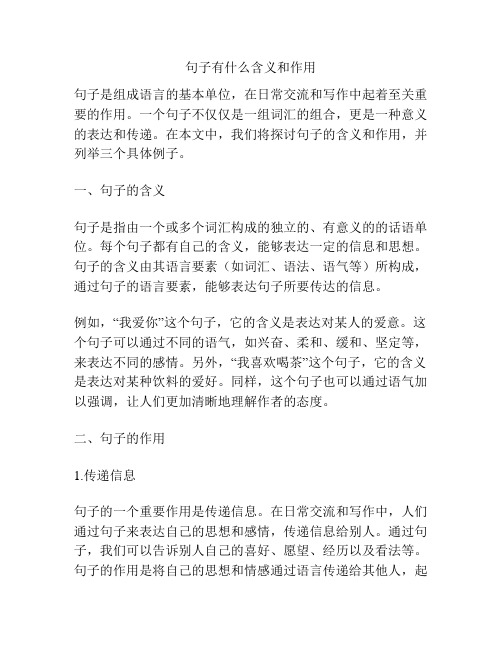
句子有什么含义和作用句子是组成语言的基本单位,在日常交流和写作中起着至关重要的作用。
一个句子不仅仅是一组词汇的组合,更是一种意义的表达和传递。
在本文中,我们将探讨句子的含义和作用,并列举三个具体例子。
一、句子的含义句子是指由一个或多个词汇构成的独立的、有意义的的话语单位。
每个句子都有自己的含义,能够表达一定的信息和思想。
句子的含义由其语言要素(如词汇、语法、语气等)所构成,通过句子的语言要素,能够表达句子所要传达的信息。
例如,“我爱你”这个句子,它的含义是表达对某人的爱意。
这个句子可以通过不同的语气,如兴奋、柔和、缓和、坚定等,来表达不同的感情。
另外,“我喜欢喝茶”这个句子,它的含义是表达对某种饮料的爱好。
同样,这个句子也可以通过语气加以强调,让人们更加清晰地理解作者的态度。
二、句子的作用1.传递信息句子的一个重要作用是传递信息。
在日常交流和写作中,人们通过句子来表达自己的思想和感情,传递信息给别人。
通过句子,我们可以告诉别人自己的喜好、愿望、经历以及看法等。
句子的作用是将自己的思想和情感通过语言传递给其他人,起到沟通和交流的作用。
例如:“明天我要去看电影。
”这个简短的句子,表达了作者的行动计划。
如果是和朋友的聊天,这句话可能就足够传达信息。
而如果是写信或做演讲,作者需要通过更多的句子来表述自己的想法。
2.构思结构句子对于语言的构思结构也有很大的作用。
句子的语法结构和词汇的组合,是语言思维的基础。
通过句子,可以清晰地表达出语言思维的结构和逻辑。
通过句子的结构和组合,能够体现出作者的思维方式和理解力。
例如:“多年来,他始终坚持自己的信念,不受任何诱惑。
”这个句子,通过并列结构,清晰地表达了作者对“信念”的坚持和对“诱惑”的抵制。
3.美化语言句子还有一个作用是为语言美化加分。
一个优美的句子,不仅可以传达信息、构思结构,还可以让读者感受到语言的魅力。
优美的句子有时还能给人带来情感上的愉悦,使人沉浸在句子中,享受语言给予我们的快乐。
句子有哪几种说明方法和作用
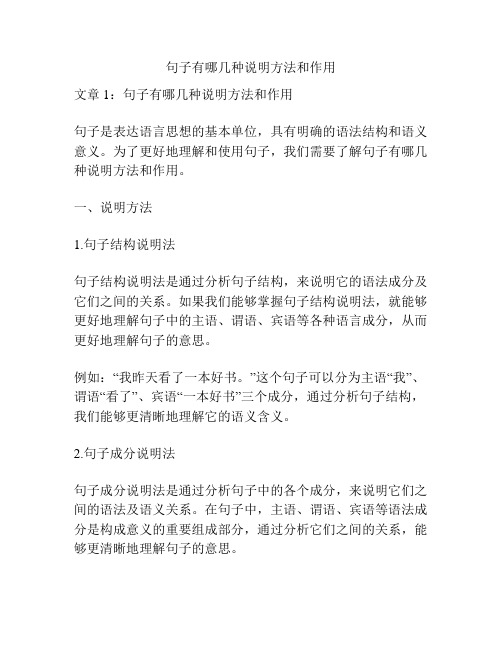
句子有哪几种说明方法和作用文章1:句子有哪几种说明方法和作用句子是表达语言思想的基本单位,具有明确的语法结构和语义意义。
为了更好地理解和使用句子,我们需要了解句子有哪几种说明方法和作用。
一、说明方法1.句子结构说明法句子结构说明法是通过分析句子结构,来说明它的语法成分及它们之间的关系。
如果我们能够掌握句子结构说明法,就能够更好地理解句子中的主语、谓语、宾语等各种语言成分,从而更好地理解句子的意思。
例如:“我昨天看了一本好书。
”这个句子可以分为主语“我”、谓语“看了”、宾语“一本好书”三个成分,通过分析句子结构,我们能够更清晰地理解它的语义含义。
2.句子成分说明法句子成分说明法是通过分析句子中的各个成分,来说明它们之间的语法及语义关系。
在句子中,主语、谓语、宾语等语法成分是构成意义的重要组成部分,通过分析它们之间的关系,能够更清晰地理解句子的意思。
例如:“他在图书馆看书。
”这个句子可以分为主语“他”、谓语“在看”、宾语“书”三个成分,通过分析它们之间的关系,我们可以更好地理解这个句子的意思。
3.句子语义说明法句子语义说明法是通过分析句子的语义含义,来说明句子的意思。
句子除了语法结构外,还有它的语义含义,通过分析它的语义含义,能够更好地理解它的意思。
例如:“张三昨天突然生病了。
”这个句子的语义含义是突然生病,通过分析它的语义含义,我们能够更清楚地理解句子的意思。
二、说明作用1.传达信息句子的主要作用是传达信息,在句子中我们可以表达自己的意思,让别人了解我们的想法、情感等。
例如:“我认为这个问题很复杂。
”这个句子可以表达出说话人对问题的看法,让别人了解他的想法。
2.表达情感句子还可以表达情感,让读者或听者了解说话人的感受,从而更好地理解句子的内涵。
例如:“我为你高兴。
”这个句子能够表达说话人的高兴情感,让别人知道他对对方的感觉。
3.引发思考句子还可以引发读者或听者的思考,让他们更多地思考句子中的内涵,对于句子的深层次含义有更深刻的理解。
- 1、下载文档前请自行甄别文档内容的完整性,平台不提供额外的编辑、内容补充、找答案等附加服务。
- 2、"仅部分预览"的文档,不可在线预览部分如存在完整性等问题,可反馈申请退款(可完整预览的文档不适用该条件!)。
- 3、如文档侵犯您的权益,请联系客服反馈,我们会尽快为您处理(人工客服工作时间:9:00-18:30)。
The relationship beerance meaning
• In many situations, utterance meaning is based on sentence meaning, however it contains more than sentence meaning, because utterance meaning is the result of the combination of sentence meaning and context. • In other words, utterance meaning is the realization of the abstract meaning of a sentence in a real situation of communication, or simply in a context.
• The meaning of an utterance is the meaning of the sentence plus the meanings of the circumstances: the time and place, the people involved, their backgrounds, their relationship to one another, and what they know about one another.
2. Sentence meaning VS. Utterance meaning
• Sentence meaning belongs to semantic area while utterance meaning belongs to pragmatic area. • Sentence meaning is abstract and decontextualized, utterance meaning is concrete and context-dependent.
Sentence meaning VS. Utterance meaning
句子意义和话语意义
1. Sentence VS. Utterance
• Sentence: A sentence is a grammatical concept. It is a group of words which are organized in accordance with established grammatical rules of languages, an abstract structure governed by grammar. • Utterance: An utterance is a unit of communication. It is the smallest unit which has certain communicative functions. This smallest unit of communication can be, in length, exactly the same as a grammatically well formed sentence . For example, " There is a dog at the gate. We'd better keep away", these two grammatically complete sentences can have the communicative value of a " warning" or "suggestion" in cetain context.
3. Example
• "John is still single", as an isolated sentence, at most, it tells us the John's marital status. If we look at it as an utterance, then in certain contexts, besides the sentence meaning, it can also imply other meanings, for example, encourage the listener to date John.
• While most utterances take the form of grammatically complete sentences, some utterances do not, and some cannot even be restored to complete sentences. For example, "Good morning!" and "Hi!" are all utterances, which have meaning in communication.
